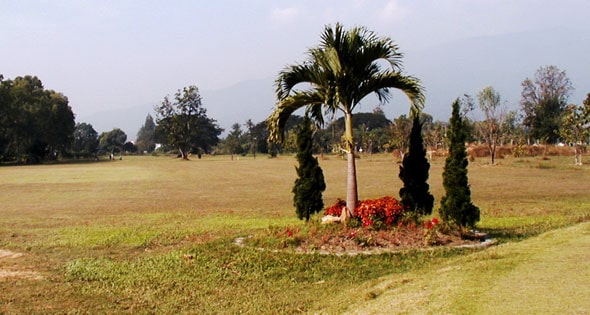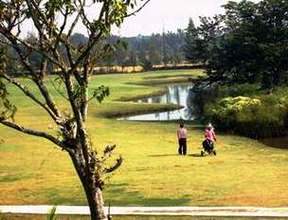Written By: Hugh Leong
I have always been active in sports. I’ve played college basketball, was on a championship softball team, ran marathons, climbed mountains and got a black belt in karate. And I have never done anything so difficult as to play golf. The game of golf is difficult enough to play in one language, Why try to do it in another?
Hey, if it were easy, why do it in the first place? So, just to give yourself another challenge, and to make your time on a Thai golf course just a little more fun, here are some basic Thai golf vocabulary words, with a bit of annotation to help with remembering them.
Enjoy your walk in the sun.

Thai golf vocabulary words
Golf: กอล์ฟ /góf/
The Thais use the borrowed word for golf (borrowed from Scottish, just like the English language does) although it is pronounced with a final “p” sound as there are no final “f” sounds in Thai. The “l” can be dropped also. And for some reason it is given a high tone.
Play golf: ตีกอล์ฟ /dtee góf/
In Thai, the term is “to hit golf” (to hit: ตี /dtee/). You can also say “play golf” เล่น /lên/ as is used in other sports. I’ve heard it used both ways.
Golfer: นักตีกอล์ฟ /nákdteegóf/ or ตีกอล์ฟ /dtee góf/
The term นัก /nák/ usually is a prefix meaning “a person who…” In this case it is pretty clear in Thai that a golfer is “a person who plays golf”.
Golf course: สนามกอล์ฟ /sà-năam góf/
The term สนาม /sà-năam/ basically means “field”. It is used with many Thai words such as:
Airport: สนามบิน /sà-năam bin/ (the flying field)
Football pitch: สนามฟุตบอล /sà-năam fút bon/ (football field)
Stadium: สนามกีฬา /sà-năam gee-laa/ (sports field)
Golf club (the stick): ไม้กอล์ฟ /máai góf/ or ไม้ตีกอล์ฟ /máai dtee góf/
The word ไม้ /máai/ means “tree” or “wood” or “stick”. For example ไม้กวาด /máai gwàat/ means “broom” or literally the stick used for sweeping. So ไม้ตีกอล์ฟ /máai dtee góf/ literally means “The stick used for hitting (playing) golf”.
Golf club (organization): ชมรมนักตีกอล์ฟ /chom-rom nák dtee góf/ or นักตีกอล์ฟ /nák dtee góf/
The word ชมรม /chom-rom/ means organization or association. The first syllable of the word is ชม /chom/ which means “to admire” or “to look at with pleasure”.
Irons: เหล็ก /lèk/
This word is usually followed by a number, as in “Nine iron” เหล็กเก้า /lèk gâo/ or “Five iron” เหล็กห้า /lèk hâa/. For a long time I got this word confused with the similar sounding เลข /lâyk/ which means “number”. I thought people were saying “number nine”. They sound very similar although the correct term “iron” is said with a low tone and the incorrect one, “number” is said with a falling tone. Who said tones in Thai aren’t important?
Woods: ไม้ /máai/
As with “irons” the Thai word for “wood” is also usually followed by a number, as in ไม้สาม /máai săam/ “3 wood”. The exception to this is the Thai word for “driver” (normally a “1 wood”). As is so often heard in Thai, we use a loan word here. The Thai word for “driver” is ไม้ดรายเวอร์ /mai drai-wer/ or simply ดรายเวอร์ /drai-wer/ (not sure of the spelling on this one but the “v” always changes to a “w” sound).
Rescue club (sometime called a hybrid club): ไม้กะเทย /máai gà-toie/
The term กะเทย /gà-toie/ literally means “gay” or “homosexual”. So this term means “homosexual or gay golf club”. In the west the term homosexual can often be derogatory but in Thailand it is simply just another way of being. The “gay golf club” describes this club quite colorfully as being neither one nor the other. Neither male nor female and neither wood nor iron. I always think the caddie is going to laugh when I ask for the ไม้กะเทย /máai gà-toie/ (gay golf club), but they just act like I am asking for any other club. Wish the rest of the world saw things so clearly.
Round (of golf): รอบ /rôp/
The word รอบ /rôp/ literally means “around” as in “go around”. Here is one thing that might be different on a Thai golf course. Many courses are only nine holes. Because it is so hot here many people limit a “round” of golf to only nine holes. On a short course like this, 18 holes would then be “2 rounds” or สองรอบ /sŏng rôp/. You might think playing only nine holes is for wimps, but wait until you’re playing in 40 degree Celsius heat. See how you feel then. One round, or หนึ่งรอบ /nèung rôp/ will probably be more than enough.
Stroke: แต้ม /dtâem/
The word แต้ม /dtâem/ in Thai is usually used to mean a “point” in a sports contest. In golf, a “stroke” is the equivalent to a “point” except, unlike in other sports, the person with the fewest “points” in golf is the winner. If it were the other way around I would be lots more successful in this game.
Hole: หลุม /lŭm/
หลุม /lŭm/ literally means “hole” as in “hole in the ground”. Rounds of golf in Thailand are usually either 9 Holes เก้าหลุม /gâo lŭm/ or 18 Holes สิบแปด /sìp bpàet/.
Water (hazard): น้ำ /nám/
น้ำ /nám/ is simply the Thai word for “water”. To be more descriptive you can say ตกน้ำ /dtòk náam/ to “fall into the water”. When said in Thai it sounds more like it is the ball’s fault because it “fell” in the water, and not because someone hit it there.
Flag (pin): ธง /tong/
ธง /tong/ is the Thai word for flag as in ธงชาติ /tong châat/, “national flag”.
Provisional (stroke): ลูกเช็ค /lôok chék/
This word probably comes from the English for “to check”. After hitting a ball so badly that you aren’t sure if you’ll ever find it, you have to hit a provisional ball, a ลูกเช็ค /lôok chék/, before you can go “check” to see if you can find your first ball.
Handicap: แต้มต่อ /dtâem dtòr/
My handicap is “the game of golf” itself.
Lay up: วาง /waang/
The term วาง /waang/ is usually translated as “put down” or “lay down” something, as in to lay something down on a table. Strangely, in Thai golfing vocabulary it means “lay UP”.
Go for it: สู้ /sôo/
When I am 200 yards from the pin and something (idiotic) in me tells me to “go for it” Thai uses the word สู้ /sôo/. สู้ /sôo/ also means “to fight” and, more appropriately, for my game, “to struggle”.
Putting ball: ลูกพัด /lôok pát/
A western golfer might ask what this is. In Thailand many golfers use a special ball for putting. Once you hit your ball onto the green you exchange it with your ลูกพัด /lôok pát/. Putting balls can be distinguished from a normal ball by their iridescent colors. Your caddie will often ask you for your ลูกพัด /lôok pát/. Just tell her you don’t use one. That is, unless you really get attached to those bright colors.
Borrowed words
The word “golf” in Thai is a borrowed word of course but you‟ll hear many other borrowed words on the golf course. Like so many other borrowed words (English to Thai), once the word is borrowed it takes on Thai characteristics – usually in the form of tones and Thai pronunciations. Below are some approximations of the, Thai not English, golfing terms.
Putt: pat
Quite often you will hear “sŏng pat” (2 putt), or “săam pat” (3 putt). Any more than that and I don’t want to hear about it. (see สองพาร์ /sŏng paa/ – “2 pars” below).
Par: paa
The final “r” is usually dropped. A big joke on the course, when I play that is, is when I get an 8 on a Par 4 hole. The caddie will then say, “You did good. You got 2 pars (สองพาร์ /sŏng paa/) on that hole.”

Pitching wedge: pi-ching
Leaves out the superfluous word “wedge”.
Caddie: ca-dee
Most courses require a golfer to hire a caddie and will not let you carry your own clubs. Even when you rent a golf cart the caddie will often do the driving. It is customary to give the caddie a nice tip no matter how terribly you played. It probably wasn’t their fault anyway. For various “Thai” reasons, almost all caddies are young females.
Birdie: bir-dee, bir-dêe
The second syllable is often given a falling tone especially when you are really excited when you are saying it. I hear this word so infrequently that it has almost fallen out of my vocabulary. But when I say it I am usually pretty excited.
Bogie: bo-gee, bo-gêe
Another falling tone on the second syllable, but this time is it usually caused by you being somewhat annoyed, with stress in your voice. But a bogie for me is “par for the course” and I am usually happy to get one.
Double bogie: da-bŭn
An oft heard term during my rounds. Make it simple and just say “double”. With a Thai pronunciation of course.
Eagle: e-gun
No final “l” sounds in Thai. They are usually changed to a final “n” sound. I have never said nor heard this word during any of my rounds.
Hole in one: ho-lin-won
I’ll have more to say about this word if it ever comes up in a conversation on the course.
Out of bounds: OB
Simple. There are lots of signs with these 2 letters on the course. And my golf balls seem to be attracted to all of them.
Green: green
Hard to forget this one.
Bunker: bun-kêr
All I can say is that bunkers are better than water.
Sand trap: san
A sand trap is also a “bunker”, and this word is used interchangeable in Thai with the loanword /san/ for “sand”. Sometimes a caddie will also use the Thai word for sand which is ทราย /saai/. Whichever word is used it doesn’t make it any more fun to play out of. But it is still better than water.
On (the green): awn
This term is usually used with the number of strokes it took you to get on the green, as in “2 on” /sŏng awn/, although the number in front when I play is more like “4 on” /sèe awn/ or “5 on” /hâa awn/.
Fore: fow
For some reasons the caddies call out this word with a “w” sound on the end. It would sound cute if I didn’t hear it so often after I hit.
Mark (ball): mát
This word is used as a noun for the “ball marker”, and as a verb “to mark” a ball. In Thailand the caddies are told that it is their job to mark the ball. If you want to mark it yourself you have to let them know in advance. It is also customary in Thailand, if a ball is right on the edge of the green, to mark it one putter head onto the green away from the edge, making the putt much easier. If you want to play by the rules of golf you must let the caddie know to mark the ball where it lies.
